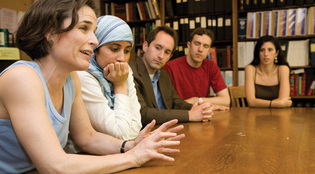 loading
loading
Light & VerityHome teamA Law School clinic takes on foreclosures in New Haven.  Julie BrownLed by Robin Golden ’79, ’98JD (left), a Law School team confronts the housing crisis. View full imageThe four-family house in New Haven is a shell of its former self: door and windows boarded, siding stripped off, even the iron porch rail gone. When a bank foreclosed on the house, it was neatly maintained and appraised at $160,000. Seventeen months later—and, crucially, after the lender evicted all four tenants—the property, now vandalized, sold for just $16,000. That fate befalls many foreclosed properties in New Haven, where renters make up 70 percent of the city. And lenders foreclosing on owner-landlords routinely evict tenants, even those who are fully paid up. It's one knot in New Haven's foreclosure tangle -- which a Yale Law School clinic, teaming up with local nonprofit agencies, is trying to unsnarl. The clinic, part of a local collaborative called the ROOF Project (Real Options, Overcoming Foreclosure), pulls in students not only from the Law School but also from the School of Management, the environment school, and the Divinity School. “We have a stock of nimble, brilliant students who can be deployed” as needed, says Sameera Fazili ’06JD, who has worked with the clinic for the past two years as a clinical lecturer. “We can help with strategy, but we can also help with implementation.” The clinic teamed up with two attorneys—Amy Marx ’00JD and Amy Eppler-Epstein ’86JD—at the New Haven Legal Assistance Association. Late last year, they persuaded Fannie Mae to stop evicting paid-up renters from foreclosed homes, not just in New Haven but nationwide. This year, students researched and drafted a letter to the banks responsible for most New Haven foreclosures. The letter led to a City Hall meeting and promises by the banks to review their eviction policies. ROOF's next major step is to target New Haven's $3.2 million share of the new federal Neighborhood Stabilization Program. Done right, the program will be a win-win: matching foreclosed homes with buyers of modest means, while bringing stability to fragile neighborhoods. Done wrong, however, it could be a waste of money. So ROOF is devising criteria to identify the most promising properties for investment. Asked whether ROOF is succeeding, law student Mirra Levitt ’10JD demurs. “It would be glib and hubristic to measure our success in the community right now,” she says. With foreclosure rates soaring in New Haven, her lawyerly caution seems well founded.
The comment period has expired.
|
|